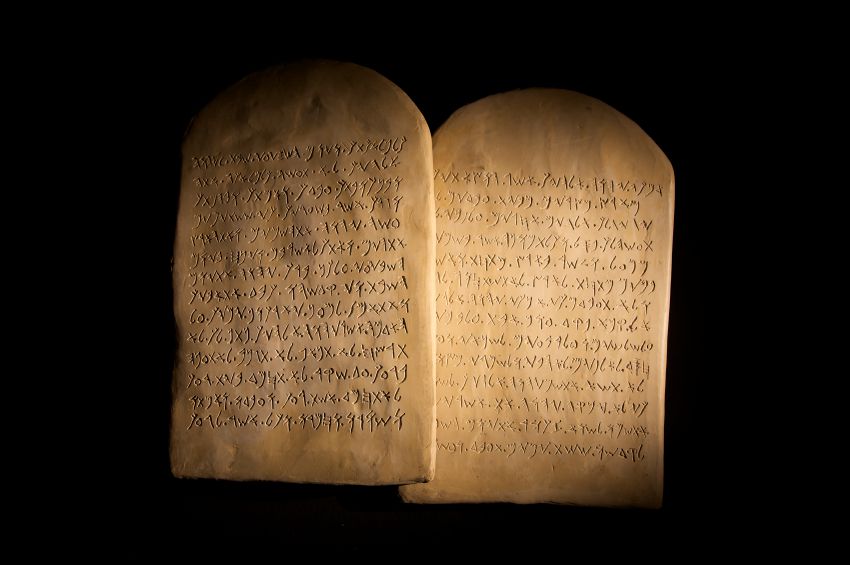The best thing you can do for your kids is to give them a healthy understanding of justification and sanctification. This doesn’t happen as often as it should partly because parents don’t understand the difference themselves. Another reason is that we have pushed away from creeds and confessions that undergird these truths in ways we don’t even recognize on a conscious level. To get back to these we must grow in our understanding ourselves and look for ways to practically age appropriately explain them to our kids. Here is how the New City Catechism describes Justification and Sanctification:
Justification means our declared righteousness before God, made possible by Christ’s death and resurrection for us. Sanctification means our gradual, growing righteousness, made possible by the Spirit’s work in us.
Growing up the Ten Commandments always loomed over me as a list of things to avoid doing, like milestones that mark the path of a well-traveled Christian life. They are what most people would say describes the life of a true Christian. The show us the moral guidelines as to how life works best. While the Ten Commandments are certainly all of these things, they are not only those things. Just the other day a friend of mine said: “The Old Testament is all law the New Testament is all grace.” While I certainly understand what he was saying, I think it is a dangerous generalization and dramatic oversimplification.
The prologue of the Ten Commandments is saturated with grace. Grace is what helps us see the law in its proper context. Not as a means of earning but to show us our need for a Savior. J.V. Fesko in his helpful book The Rule of Love explains the role of the commandments.
Divorced from the prologue, the Ten Commandments are disconnected from their historical (the Law delivered at Sinai), covenantal (the fulfillment of the Abrahamic covenant), and redemptive contexts (the deliverance from Egypt). By disconnecting the Law from its moorings, the Law becomes the very thing it was never intended to be, a legalistic ladder by which some might attempt to earn salvation. When the prologue is connected to the Law, it ultimately directs us to Christ, for it points us to the Abrahamic covenant, which finds its fulfillment in Christ. Jesus has fulfilled the bond of love on our behalf.
Fesko, J. V. (2009). The Rule of Love: Broken, Fulfilled, and Applied (pp. 15–16). Grand Rapids, MI: Reformation Heritage Books.
[Tweet “The Law of God is supposed to make us say thank you. “]
The Law is supposed to make us say thank you. Thank you to Jesus because he fulfilled the law perfectly in our place. Thank you to Jesus who lived a perfect life in our place who died for us saving us because he loves us not because we did anything to deserve to be loved. We need to teach our kids to say “Thank You, Jesus. That you lived for me and died instead of me.”
The Law was never intended to be the means for earning our salvation. On the contrary, since the Abrahamic covenant was fulfilled in Christ, the same promise upon which Israel’s redemption from Egypt was founded, then it stands to reason that the Israelites were to look to Christ, not the Law, for their redemption.
Wherefore the law was our schoolmaster to bring us unto Christ, that we might be justified by faith” (Gal. 3:23–24).
The Israelites were to look at the Law, see that they did not measure up to its rigorous demands, then look to the only one who could fulfill the requirements of the Law—Jesus Christ
Fesko, J. V. (2009). The Rule of Love: Broken, Fulfilled, and Applied (p. 14). Grand Rapids, MI: Reformation Heritage Books.
The Law is supposed to make us ask for help. As Paul says in Galatians the Law is a schoolmaster to bring us to Christ. We look at the Ten Commandments and we realize how much we don’t measure up to them. We see how we fail to keep any of them. The Law is not our means, of salvation. We are not Justified by doing we are justified by faith in Christ alone. Our sanctification is the process of the Holy Spirit speaking to us through the word. Where He points out to us where we fall short and supplying the power and the grace to change as we walk day by day in the grace, He provides. We can’t live a holy life without the power of Christ in us. The Ten Commandments first point us to Jesus who kept the Law of God perfectly something we could never do. Then Christ points us back to the Commandments to show us how life works best. To help our kids understand the Ten Commandments we have to teach our kids to say “Help, I can’t do this on my own. Jesus I need your help”
Kids understand Help and Thank You. “Thank You” speaks to our Justification. We did nothing to earn it. It is a gift to which we can only say thank you. “Help” speaks to our Sanctification. We can’t do it on our own we need God’s help. As parents, we need to teach our kids over and over again to say Thank You for such a great salvation and ask for Help because apart from Him we can do nothing. That is especially true when it comes to living a holy life.

